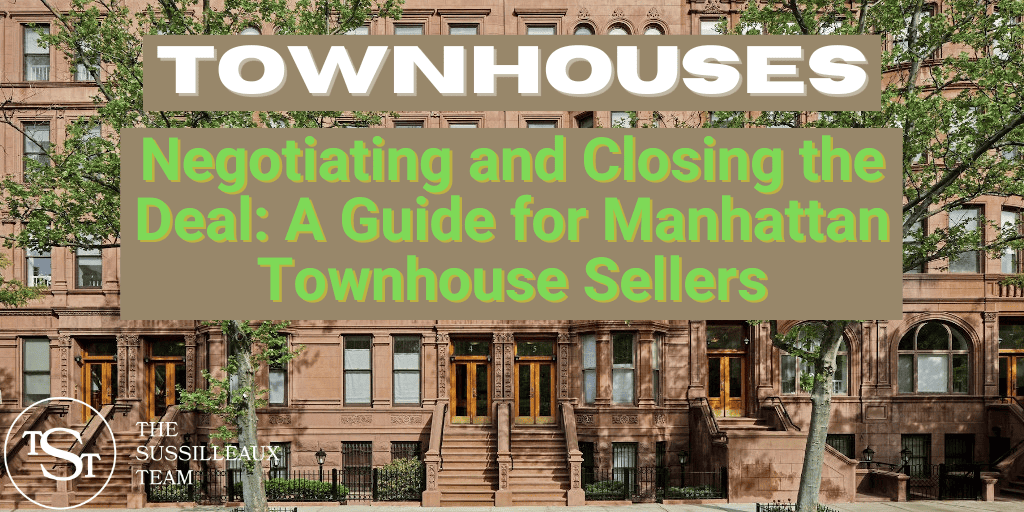Introduction to Selling a Manhattan Townhouse
Selling a Manhattan townhouse is both an art and a science, and the key to a successful sale lies in mastering the process of negotiation and closing the deal. The Manhattan townhouse market is highly competitive and offers unique challenges, so understanding the ins and outs of this prestigious real estate landscape is essential for sellers.
Dina and I have been selling real estate in Manhattan and Brooklyn for over 20 years. We especially love working with townhouse owners. NYC Townhouses are very different from condos and co-ops, and it’s even more important for you as the seller to partner with a talented, experienced broker.
We have the expertise in townhouse sales gathered over many successful transactions over the years. We are always amazed when we come across inexperienced real estate agents giving misplaced and often detrimental guidance to their clients.
We are writing this article to enable you to leverage our experience and negotiating expertise for your situation.
So please read on, and feel free to reach out to us with any questions you may have.
Preparing Your Manhattan Townhouse for Sale
We feel it’s important to briefly mention some of the factors that directly affect the value of your property, and thus contribute positively to the strength of your position in future negotiations.
Importance of staging and presentation
First impressions are crucial when selling a townhouse in Manhattan. Staging and presentation can significantly impact the perceived value of your property. Invest time and effort in decluttering, cleaning, and highlighting your townhouse’s best features, both inside and out. Consider hiring a professional stager to maximize your property’s appeal to potential buyers.
For a deep dive in preparing your home for maximum results, check out our article: Preparing Your Manhattan Townhouse for Sale: Essential Tips.
Pricing your townhouse competitively
Conducting a comparative market analysis
Pricing your Manhattan townhouse competitively is crucial for attracting interest and offers. To determine the right price, start by reviewing a comparative market analysis (CMA), prepared by your real estate agent. Analyze recent sales of similar properties in your neighborhood, considering factors like size, location, and condition. This will give you a solid foundation for pricing your townhouse accurately.
Dive deep into pricing with our article: Determining the Market Value of Your Manhattan Townhouse.
Working with a local real estate agent
Your experienced real estate agent is invaluable in helping you price your property correctly. They have access to up-to-date market data and can provide insights into local trends and buyer preferences. Additionally, they can advise on strategic pricing to ensure your townhouse stands out in the competitive market.
There are a lot of factors to consider when choosing your broker. We provide a roadmap for the selection process in our article titled: The Importance of a Real Estate Agent When Selling Your Manhattan Townhouse.
Michael and Dina are happy to meet with you and discuss your unique situation. Reach out HERE to set up a no obligation consultation.
Marketing your townhouse effectively
Professional photography and virtual tours
High-quality visuals are essential for capturing potential buyers’ attention. Your real estate broker will invest in professional photography that showcases your townhouse’s best features and unique characteristics. Additionally, consider creating virtual tours that allow prospective buyers to explore your property from the comfort of their homes, increasing the reach of your listing.
Utilizing online listings and social media
Experienced brokers have the resources to leverage online listing platforms and social media to maximize exposure for your New York City townhouse. Optimize your listing with a compelling description and relevant keywords to attract potential buyers.
Our article: Effective Marketing Strategies for Manhattan Townhouses covers this topic in great detail.
Understanding the Manhattan Townhouse Buyer
Demographics and target audience
Knowing your target audience is crucial for tailoring your marketing and negotiation strategy. Manhattan townhouse buyers typically include families, professionals, and investors. Consider the demographics and preferences of these groups when staging, pricing, and marketing your property.
Common concerns and questions
Address potential buyers’ concerns and questions early in the process. Common issues include property condition, maintenance costs, and potential renovation needs. Be transparent about these matters and provide detailed information to put buyers at ease.
Identifying motivations and unique selling points
A great broker works to understand buyers’ motivations. This knowledge allows your broker to emphasize your townhouse’s unique selling points. For instance, if buyers are looking for a family home, your agent should highlight features such as spacious living areas, and proximity to schools and parks. If they’re investors, emphasize potential rental income and property appreciation. Tailoring the approach to buyers’ motivations can make your property more appealing and improve your chances of closing the deal.
I find that this is where many brokers fall short. They have a style and routine for how they list and show properties. With townhouses, the pool of buyers is much more eclectic. I make a conscious effort to sit down with my sellers in advance of the listing and explain in detail how we plan on showing their property in the best light, and utilizing the best methods for the likely target customer. Naturally,, we don’t exclude any buyer for any reason, but different properties generally appeal to different buyers.
Case Study: Multi-family investment property
Background:
A multi-family townhouse was listed by another broker on a beautiful tree-lined street on the Upper West Side, but it wasn’t selling.
The Turning Point
After the exclusive listing agreement with the other broker expired, he owner reached out to us to see we could identify the problem, and get his property sold. We realized that the former broker had concentrated how beautiful the street was, and presented the property as having the potential for a lovely single-family home. While not unreasonable, he completely neglected the more numbers-oriented investor pool. Specifically buyers who invested in properties like this one for income and long term appreciation.
The Result:
We shifted the marketing strategy to highlight the investment potential of the property, and reached out directly to our pool of close to 200 investors/developers.
We successfully sold the building to a lovely young professional couple just starting their real estate investment career. They relished the idea of living in a beautiful townhouse apartment, while collecting rent from tenants.
The Art of Negotiation for NYC Townhouse Sellers
Developing a negotiation strategy
Setting your expectations
Before entering negotiations, establish your expectations for the sale. Determine the minimum price you’re willing to accept and identify any non-negotiable terms. Having a clear idea of your goals will help you navigate the negotiation process with confidence and make informed decisions.
Understanding the buyer’s position
Gaining insight into the buyer’s perspective can strengthen your negotiation strategy. Consider their motivations, financial situation, and any potential concerns. This knowledge will enable you to anticipate their needs and present counteroffers that address their concerns while protecting your interests.
PRO TIP: We always google the buyer and look them up in a reverse address database to find out as much about them as we can.
Key negotiation tactics
Don’t Accept the First Offer As-Is
While it can be tempting to accept the first offer that comes your way, especially if it’s a decent one, it’s rarely the best strategy when selling your Manhattan townhouse. Initial offers are typically starting points for negotiation, and buyers often expect some back-and-forth before settling on the final price. By accepting the first offer, you could be leaving significant money on the table and missing the chance to negotiate better terms.
Always Present a Counteroffer
The negotiation process starts in earnest when you present a counteroffer. This not only signals to the potential buyer that you are serious about negotiating, but it also helps to establish a range within which you can both agree. Your counteroffer should be based on a realistic assessment of your townhouse’s value, the state of the Manhattan real estate market, and your eagerness to sell.
PRO TIP: I said “Always” in the heading, but that’s not strictly applicable all the time.
If you receive a ridiculous bid, there’s no need to pare away at your price in a misguided effort to “meeting in the middle”. Meeting in the middle is sometimes a great move, but if you don’t consider the bid to be in the ballpark, we recommend that you come back with a counter-offer similar to this:
“Thank you very much for your offer. Unfortunately, it considerably lower than any price I would seriously consider. However, in the spirit of good faith negotiations, I am willing to lower my asking price by $5,000.”
If these buyers were just throwing a number in the air, no real harm done. If they’re serious buyers, but just being cheeky, they have to come back considerably stronger to be taken seriously. If they come back with a $5,000 increase to match your’s, you simply say that your counter-offer was in good faith, but apparently we won’t be reaching a deal. Thank you and good luck to you.
Be Reasonable – Make a Serious Counteroffer
This of course assumes that the initial offer was reasonable.
While it’s essential to make a counteroffer, it’s equally crucial that your counteroffer be reasonable and well-thought-out. A counteroffer that’s too high can scare off a potential buyer and end the negotiation process prematurely. On the other hand, a counteroffer that’s too low might make the buyer question the quality or value of your property. Striking a balance involves careful consideration of the property’s value and market conditions, coupled with a clear understanding of your bottom line.
Insist that the Potential Buyer Provide Proof of Funds and/or Mortgage Pre-Approval
Before engaging in serious negotiations, it’s essential to verify the potential buyer’s financial readiness. By insisting on proof of funds and/or mortgage pre-approval, you ensure that the buyer has the means to follow through with the purchase. This step not only weeds out unserious buyers but also protects you from wasting time on negotiations that are unlikely to lead to a successful sale.
Case Study: The $10,000 townhouse.
Background:
We always demand proof of funds on behalf of our clients. Townhouse transactions are between the buyer and seller, and often don’t even involve banks (cash deals). With no condo or co-op board involved, more buyers that you would ever suspect attempt to invoke “creative financing ” techniques whereby they are able to complete the purchase with little or no money down.
The Scenario:
We represented the seller of a townhouse and received a call from the “assistant” to a woman who declared that “Mrs X” will be available to view your listing tomorrow, from 2:15 to 2:45 PM, she expects to see you then.” We took her information and scheduled the showing.
The Showing:
At the appointed time, a 15 year old Cadillac pulls up and a “driver” hops out to open the rear door for Mrs. X. She emerges from the car dressed like she was going to a wedding in the 1980’s and had on dark sunglasses. Her driver fawned all over her like a servant of years gone by. She walked regally through the property, but held her head high and kept face devoid of emotion – as if she were walking through an unclean and smelly locker room. She left after 15 minutes and hardly said a word. Her driver feebly said that she would get back to us.
The Sting:
Sure enough, we received a certified letter from Mrs. X. with her offer.
We had 24 hours to respond, or the offer would automatically be rescinded. She offered to pay the full asking price, with the condition that the seller provide financing to her at below market terms, and that furthermore the seller was to absorb all the closing costs for both sides of the transaction.
To top off this sweet deal? She was willing to put down $10,000 and have the seller finance the remainder.
The Outcome:
Mrs. X. was trying to purchase a multi-million dollar townhouse for $10,000. The whole charade was amateurish and laughable, and needless to say we did not respond to her 24 hour offer. But this is what we see all the time, and why it is so important that we demand proof of the ability to complete t he purchase.
The Inside Track: Secrets of Negotiation
Real Estate Transactions are Based on Emotion – And Supported by Facts
While the sale of a Manhattan townhouse is, at its core, a business transaction, it’s also profoundly influenced by emotions. Buyers are often drawn to a home due to an emotional connection, while facts and figures support their decision. As a seller, it’s crucial to present your townhouse in a way that stirs positive emotions in potential buyers, while also providing concrete facts, like recent upgrades or nearby amenities, that support the perceived value of your property.
It’s Not All About Price: Terms Matter
While price is a key aspect of real estate transactions, it’s far from the only factor. The terms of the sale can also greatly influence the desirability of an offer. These can include aspects such as the closing timeline, contingencies (such as the buyer selling their current home), and who pays for certain costs like inspections or closing costs. For example, a lower offer with fewer contingencies and a faster closing might be more attractive than a higher offer with numerous conditions and a protracted closing timeline.
Counteroffers and concessions
Be prepared to make counteroffers and concessions to reach an agreement. Determine which aspects of the deal you’re willing to compromise on, such as price, closing date, or contingencies. Being flexible in your negotiations can foster goodwill and encourage the buyer to make concessions as well.
Responding to contingencies
Contingencies are common in real estate transactions and can include home inspections, financing, and appraisal requirements. Be prepared to address these contingencies and consider offering concessions or adjustments to the sale terms to keep the deal moving forward.
Working with your real estate agent
Communication and collaboration
Maintaining open and consistent communication with your real estate agent is crucial during negotiations. Collaborate closely with them to develop a negotiation strategy, discuss potential counteroffers, and stay updated on the buyer’s position. Your agent can provide valuable advice and guidance throughout the process.
Leverage our expertise in your townhouse sale
Our experience and expertise can be instrumental in successfully negotiating the sale of your Manhattan or Brooklyn townhouse. Our success with tough negotiations even led us to being recruited by our Firm’s senior management to teach classes to other agents across all our offices in negotiation skills and tactics.
Trust in our insights and follow consider our recommendations carefully, as we have the experience and deep understanding of the local market and buyer preferences. We will help you navigate your way through complex negotiations and achieve the best possible outcome for you.
We’re happy to sit down with you, or simply have a chat on the phone to talk more about your situation. Here’s how to reach us.
Closing the Deal on Your Manhattan Townhouse Sale
Reviewing and accepting the offer
Once you receive an offer, carefully review its terms and conditions with your real estate agent. Evaluate the proposed price, contingencies, and closing timeline to determine if the offer aligns with your expectations. If you’re satisfied with the offer, you can accept it and move forward with the closing process.
Managing contingencies and inspections
After accepting the offer, work with your agent to address any contingencies outlined in the contract. This may involve coordinating home inspections, appraisals, or other necessary steps. Timely and efficient management of these contingencies is essential for keeping the deal on track and ensuring a smooth closing.
Preparing for closing
Coordinating with the buyer and their attorney
As the closing date approaches, your attorney will need to coordinate with the buyer and their attorney to finalize the necessary paperwork, address any outstanding issues, and ensure all parties are prepared for the closing.
Ensuring all paperwork is in order
Organize and review all relevant documents, such as the deed, property disclosures, and title insurance. Ensure that all paperwork is accurate and complete to avoid any delays or complications during the closing process. Your real estate attorney will take the lead on this and guide you through the process.
Deal Terms
Deal terms encompass the broader aspects of a real estate transaction, beyond the sale price. These can include the amount of earnest money deposit, the division of closing costs, and arrangements for any personal property included in the sale. When reviewing an offer, it’s crucial to assess these terms carefully, as they can significantly impact the net profit from the sale and the smoothness of the transaction process.
Concessions
Buyer concessions are instances where the seller agrees to make financial allowances to help facilitate the sale. Common concessions include covering closing costs or providing a credit for home repairs. Other common concessions stem from issues identified in the inspection report and include repairs to be completed by the seller prior to closing.
While these can make an offer more appealing to the buyer, they directly reduce your bottom line. Therefore, concessions should be carefully evaluated in the context of the overall profitability of the deal.
Contingencies
Contingencies are conditions that must be met for the sale to proceed and they offer protection for the buyer if those conditions are not met. Typical contingencies include home inspections, financing, and appraisal. While they can give the buyer confidence in the transaction, they also introduce elements of uncertainty for the seller. As a seller, you’ll need to consider the risks associated with each contingency and how they might impact the certainty and timeline of the sale.
Price
The sale price is, of course, a crucial aspect of any real estate offer. However, it’s essential to understand that the highest offer isn’t always the best one. For example, an offer with a high price but a slew of contingencies might not be as appealing as a lower-priced offer with fewer conditions. It’s important to consider the price in the context of the overall package being offered by the buyer.
Closing Date
The closing date, or the date on which the sale will be finalized, can significantly influence the attractiveness of an offer. A buyer who can offer a swift closing might be more appealing if you’re keen to sell quickly, while a later closing date might be more suitable if you need more time to prepare for the move. The closing date can impact not just the timeline of the sale, but also your moving expenses and the coordination of any subsequent real estate purchases you’re planning. It’s a crucial element to consider when deciding to accept an offer.
The closing process
Understanding closing costs and fees
Be prepared for the closing costs and fees associated with the sale of your townhouse. These may include attorney fees, transfer taxes, broker fees, and title insurance premiums. Consult with your real estate agent and attorney to obtain a clear understanding of your financial responsibilities at closing.
Final walk-through and closing day
Prior to the closing day, the buyer will typically conduct a final walk-through to ensure that the property is in the agreed-upon condition and that any negotiated repairs have been completed. On the closing day, you’ll meet with your attorney, the buyer, their attorney, and your real estate agent to sign the necessary documents, exchange funds, and transfer ownership of the property.
Conclusion
Successfully negotiating and closing the deal on your Manhattan townhouse sale requires preparation, understanding the market, and effective communication with potential buyers and your real estate agent. By following the steps outlined in this guide, you can navigate the complex process of selling your Manhattan townhouse with confidence and achieve a favorable outcome.
There are so many more details in these processes, but we hope that we provided you with an overview of what’s involved in negotiating and closing a townhouse sale.
Further reading
You can return to The Complete Guide to Manhattan Townhouses, or go to the preceding article: Effective Marketing Strategies for Manhattan Townhouses , or read the final article in the Selling your townhouse series: The Importance of a Real Estate Agent When Selling Your Manhattan Townhouse
Frequently Asked Questions (FAQs)
- How long does it typically take to sell a Manhattan townhouse?
- What are the most important factors to consider when pricing my townhouse for sale?
- Should I accept the first offer I receive or wait for a better one?
- How can I make my Manhattan townhouse stand out from the competition?
- Are there any legal considerations specific to selling a townhouse in Manhattan?
How long does it typically take to sell a Manhattan townhouse?
The time it takes to sell a Manhattan townhouse can vary greatly depending on factors such as the property’s location, condition, and pricing strategy. On average, it may take anywhere from 3 to 6 months to complete the entire sales process, from listing to closing. Market conditions, such as supply and demand, and the time of year can also play a significant role in determining how long it takes to sell a townhouse. In a hot market, a well-priced and desirable property may receive multiple offers and sell quickly, while in a slower market, it may take longer to attract the right buyer.
What are the most important factors to consider when pricing my townhouse for sale?
When pricing your townhouse for sale, it’s essential to consider several factors to ensure you attract the right buyers and achieve the best possible sales price. The most important factors include the property’s location, size, condition, and any unique features or amenities. It’s also crucial to research recent sales of comparable properties in your area to understand the current market conditions and trends. Working with an experienced real estate agent who specializes in Manhattan townhouses can provide valuable insight and guidance on the right pricing strategy for your property.
Should I accept the first offer I receive or wait for a better one?
Deciding whether to accept the first offer you receive or wait for a better one depends on many factors, including the current market conditions, the offer’s terms, and your personal circumstances. If the first offer meets or exceeds your asking price and has favorable terms, it may be worth considering. However, if the offer is significantly lower than your asking price or has undesirable terms, you may want to wait for other offers to come in.
Consider the overall market conditions when making your decision. In a seller’s market, where demand is high and inventory is low, you may have more leverage to negotiate and potentially receive multiple offers. On the other hand, in a buyer’s market, where there is more inventory and less demand, accepting a reasonable offer early on could be advantageous to avoid your property sitting on the market for an extended period.
Ultimately, it’s essential to consult with your real estate agent to weigh the pros and cons of each offer and determine the best course of action based on your specific goals and circumstances.
How can I make my Manhattan townhouse stand out from the competition?
To make your Manhattan townhouse stand out from the competition, focus on enhancing its curb appeal, staging the interior, and highlighting its unique features. Start by making sure the exterior is clean, well-maintained, and inviting. Fresh paint, well-manicured landscaping, and updated lighting can significantly impact a potential buyer’s first impression.
For the interior, consider hiring a professional stager to create an inviting, spacious, and stylish environment. Remove clutter, depersonalize the space, and ensure that each room is well-lit and showcases its best features. High-quality photographs and a compelling property description can also help your townhouse stand out in online listings.
Finally, work with your real estate agent to market your property effectively, targeting the right audience and using various platforms to maximize exposure. Utilize professional photography, virtual tours, and social media to showcase your townhouse’s unique features and amenities. Host open houses and private showings to give potential buyers an opportunity to experience the property firsthand.
Your real estate agent’s expertise and network can also be invaluable in spreading the word and generating interest among qualified buyers. Their knowledge of the local market and connections with other professionals can help ensure your townhouse stands out and attracts the right buyers.
Are there any legal considerations specific to selling a townhouse in Manhattan?
When selling a townhouse in Manhattan, there are several legal considerations to keep in mind. First, you’ll need to ensure that you comply with all local and state regulations, such as disclosure requirements. In New York State, sellers are required to provide a Property Condition Disclosure Statement to potential buyers, outlining any known defects or issues with the property.
It’s also essential to consider the tax implications of selling your townhouse, such as potential capital gains tax or New York State’s transfer tax. Consulting with a real estate attorney or tax professional can help you navigate these legal considerations and ensure a smooth transaction.
In summary, selling a Manhattan townhouse involves several legal considerations, and working with experienced professionals such as an experienced real estate agent and real estate attorney can provide valuable guidance and support throughout the process.





